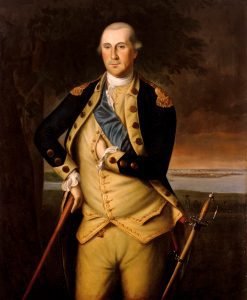Should retired military officers become politically engaged?
Admiral Steve Abbot, USN (Ret.) discusses why he became involved in presidential elections.
Retired military officers’ unique life experiences and perspectives as veterans offer valuable insights into national security, foreign policy, and defense matters uncommon in our population.
According to the 2022 Census, only 6% of Americans are military veterans. The vantage point of retired Generals and Admirals strengthens the democratic process. Like every other American, they have a right to express their political perspectives without constraint.
Some claim retired military officers should remain silent on political issues; NSL4A understands America is stronger when they engage in political discourse.
Veterans’ civic duty does not end when they hang up their uniforms; rather, it extends to actively participating in shaping the nation's future.
Throughout their careers, they took an oath to defend the Constitution of the United States against all enemies, foreign and domestic, and that commitment remains just as strong in retirement.
“Start being a leader as soon as you put on your civilian clothes. If you see intolerance and hate, speak out against them. Make your individual voices heard, not for selfish things, but for honor and decency among men, for the rights of all people.”
Historical precedent demonstrates that retired flag officers have endorsed candidates from both parties since the second half of the 20th century.
1946
Commanding General of the Fourth Army, General J.M. Wainwright, sent a letter to all “All Personnel Being Discharged From The Army of The United States.” He instructs them to be leaders as soon as they put on their civilian clothes. “No American can afford to be disinterested in any part of his government, whether it is county, city, state or nation.”
He concludes with an open invitation for all who served in uniform to continue to serve out of uniform by telling these soon-to-be veterans to “Choose your leaders wisely.”
1992
Retired Chairman of the Joint Chiefs of Staff Admiral William Crowe endorsed Bill Clinton
2004
Retired Commandant of the Marine Corps General P. X. Kelley made public endorsements for President George W. Bush
Retired Chairman of the Joint Chiefs General John Shalikashvili spoke at the 2004 Democratic Convention in addition to several endorsements from retired senior military officers endorsing John Kerry.
2008
Nearly 300 retired generals and admirals from around the country endorsed John McCain for president.
Barack Obama also received endorsements from retired generals and admirals, most notably former Secretary of State General Colin Powel.
2012
Over 300 retired admirals and generals supported Romney's campaign.
Former Secretary of State General Colin Powel and former Vice Chairman of the Joint Chiefs Admiral John Natman reaffirmed their endorsements of President Barack Obama
2016
Trump campaign announced endorsements from 88 retired military officers
Hillary Clinton campaign announced endorsements from 110 retired military officers
2020
Some 235 retired senior military officers signed a letter backing the reelection of President Donald Trump
This practice is not a recent trend but a longstanding tradition reflecting their commitment to serving the nation beyond their active duty years.
Many former senior military leaders, including former Presidents George Washington, Ulysses S. Grant, and Dwight D. Eisenhower, have entered the political arena themselves, underscoring the compatibility of military service and political engagement.
In the current political climate, where the future of American democracy hangs in the balance, the stakes are too high to remain silent.
Retired Military Officers took an oath to support and defend the Constitution, and can continue to honor that oath by speaking out against threats to our democratic institutions and values.
Whether they endorse candidates who will strengthen our position in the world or speak out against those whose actions undermine our democracy, they have a responsibility to safeguard the future of our nation for generations to come.





